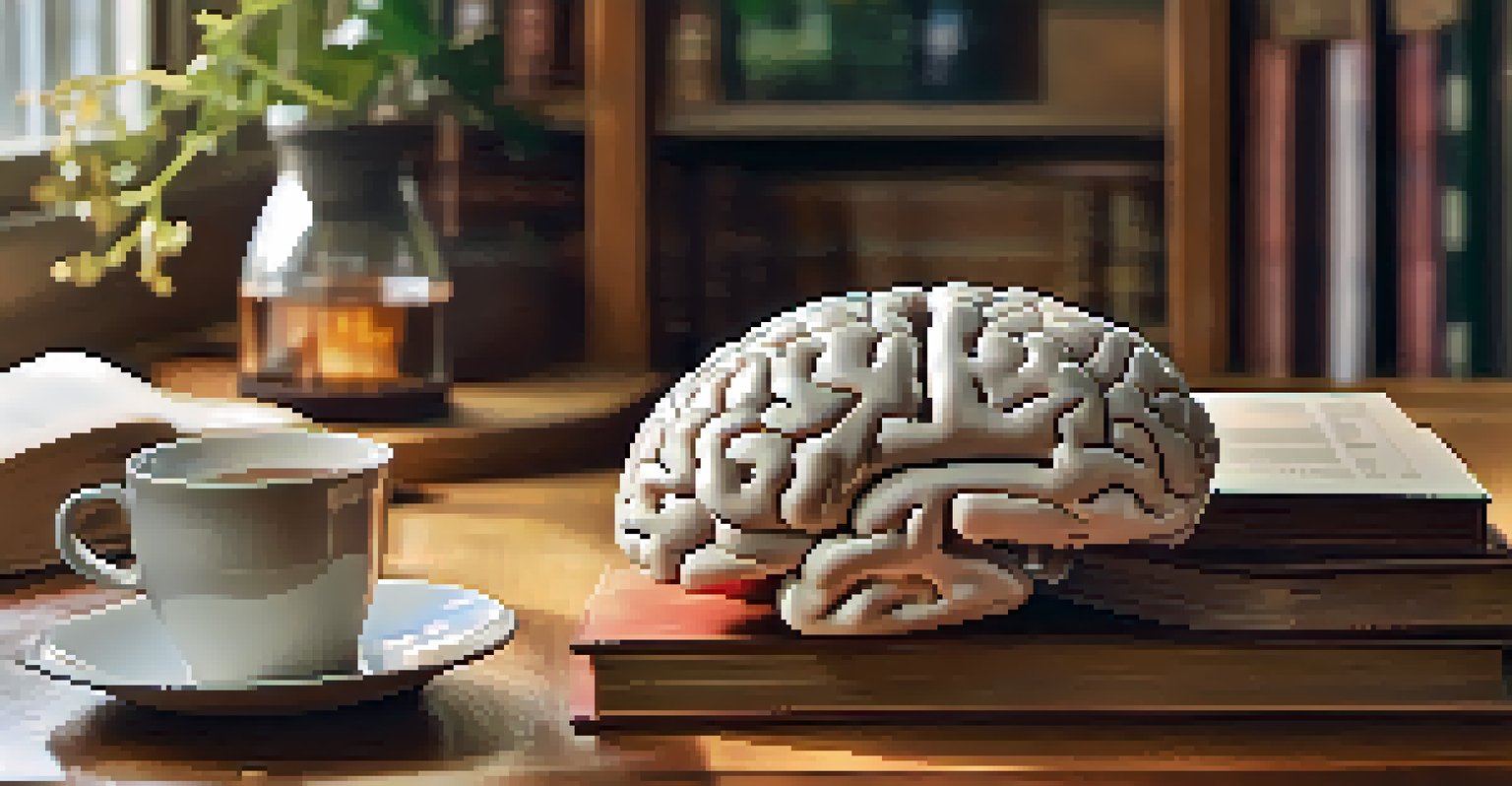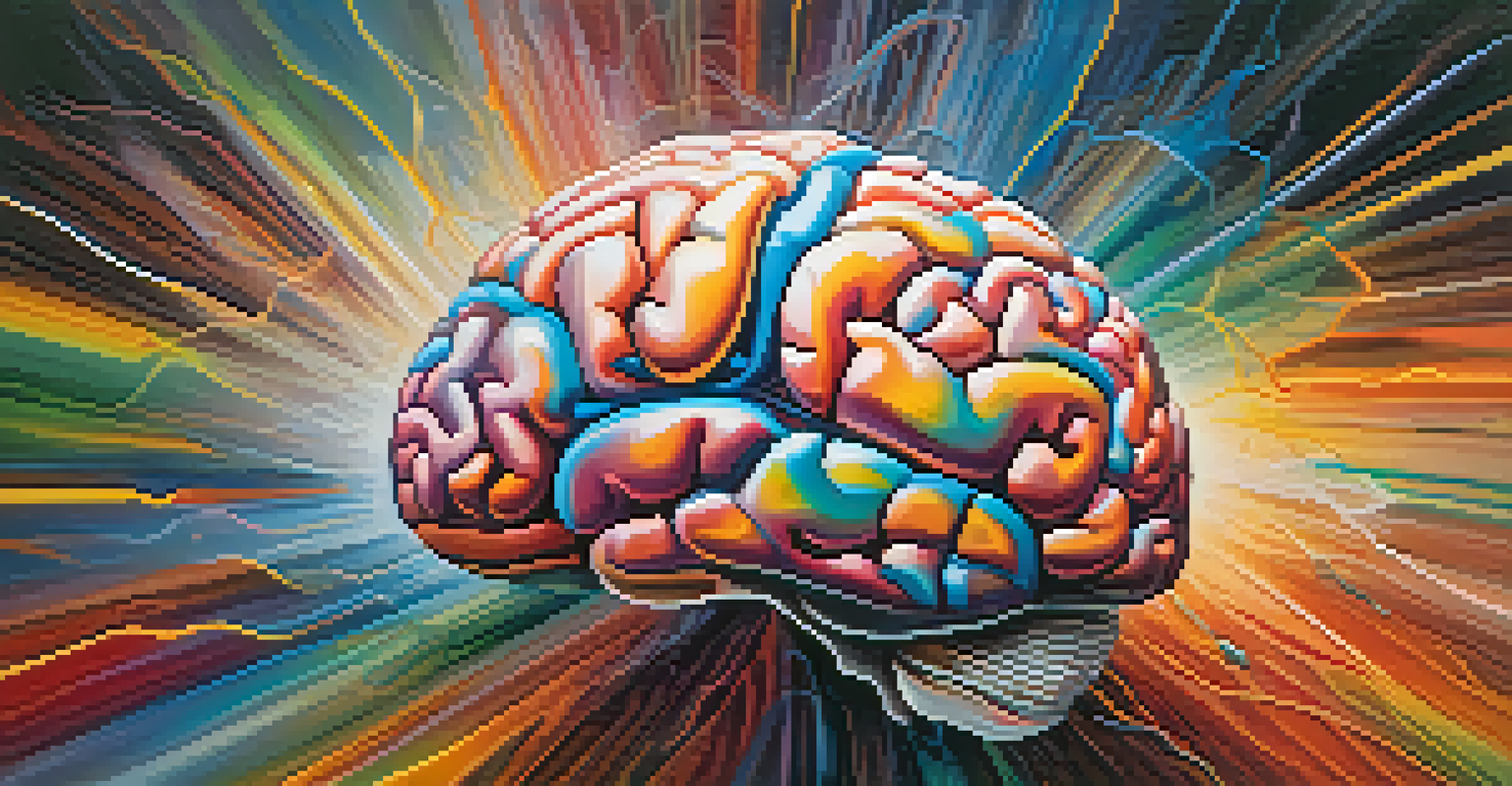Addiction and Memory: How Substance Abuse Alters Recall Ability

Understanding Addiction and Its Effects on the Brain
Addiction is a complex condition that affects the brain's chemistry and functioning. It often leads to compulsive behaviors and an overwhelming desire to consume substances despite negative consequences. Over time, substance abuse can cause significant changes in brain structure and function, impacting areas related to memory and learning.
Addiction is a symptom of not growing up, and it is a way of avoiding reality.
When individuals engage in substance abuse, the brain's reward system becomes altered. This disruption can impair cognitive functions, including recall abilities, making it hard to retrieve information. Simply put, the brain begins to prioritize the substance over other important memories and tasks.
Moreover, the type of substance used can play a pivotal role in how memory is affected. For instance, alcohol and stimulants can lead to different kinds of memory impairments, influencing both short-term and long-term recall. Understanding these nuances helps us grasp the full impact of addiction on memory.
How Substance Abuse Impairs Memory Formation
Substance abuse can severely hinder the brain's ability to form new memories. This occurs primarily due to the disruption of neurotransmitters, which are essential for communication between neurons. For example, drugs like cocaine can flood the brain with dopamine, which, while initially pleasurable, ultimately hampers the brain's ability to process new information.

As a result, individuals may find it challenging to remember recent events or learn new skills. This can lead to feelings of frustration and confusion, as they struggle to keep up with daily life. For some, this impairment can create a vicious cycle, prompting increased substance use to escape the discomfort of memory loss.
Addiction Alters Brain Function
Substance abuse significantly disrupts brain chemistry, impairing memory and cognitive processes.
Additionally, the context in which substances are used can further complicate memory formation. Environments associated with drug use can trigger cravings and lead to reliving past experiences, blurring the lines between memory and reality. This association can create a distorted sense of recall, making it difficult to differentiate between past and present.
The Connection Between Memory and Behavior in Addiction
Memory and behavior are deeply intertwined, especially in the context of addiction. The memories associated with drug use—both positive and negative—can influence future behaviors and choices. For instance, a person may recall the euphoric feelings from a past high, prompting them to seek that experience again despite knowing the risks.
The greatest discovery of my generation is that a human being can alter his life by altering his attitude.
This cycle of behavior driven by memory can lead to relapse, as the brain prioritizes the reward of substance use over the consequences. It’s a bit like a hamster on a wheel, continuously running without getting anywhere, stuck in a loop of craving and consumption. Understanding this connection is crucial for effective treatment and recovery.
Furthermore, therapeutic interventions often focus on reshaping these memories and behaviors. Cognitive-behavioral therapy, for example, aims to break the associations between drug use and positive memories, helping individuals to forge healthier connections. By addressing the underlying memory issues, individuals can better manage their behaviors and improve their chances of recovery.
The Impact of Withdrawal on Memory Recall
Withdrawal from substances can bring about a host of cognitive challenges, including memory recall issues. As the body adjusts to the absence of a substance, individuals may experience heightened anxiety or depression, which can cloud their ability to think clearly. This mental fog can make remembering information feel like a daunting task.
During withdrawal, the brain is also in a state of chaos, trying to rebalance itself after the disruption caused by substance abuse. This can lead to lapses in memory or difficulty recalling even familiar information. It’s akin to trying to find a familiar path through a foggy landscape—you know it’s there, but it’s hard to see.
Memory Impacts Recovery Efforts
The relationship between memory and behavior in addiction complicates recovery, making it essential to address memory issues during treatment.
As a result, many individuals in recovery report struggles with memory, which can be frustrating and disheartening. Understanding that these challenges are common can help alleviate some of the stress, allowing individuals to focus on their recovery journey. With time and support, many can regain their memory functions.
Long-Term Effects of Addiction on Memory Function
The long-term effects of addiction on memory can be profound and lasting. Even after achieving sobriety, many individuals may continue to experience memory deficits. Research shows that prolonged substance abuse can lead to structural changes in the brain, particularly in areas responsible for memory and learning, such as the hippocampus.
These changes can manifest as difficulty with both short-term and long-term memory recall. Individuals may struggle to remember recent conversations or events, which can impact personal relationships and daily functioning. It’s a sobering reminder of how deeply addiction can affect not just the mind, but also the essence of who we are.
However, it’s important to note that recovery can lead to improvements in memory over time. Engaging in cognitive training, mindfulness practices, and a healthy lifestyle can help stimulate brain function and promote memory recovery. While the journey may be challenging, many find hope in their ability to regain cognitive clarity.
Treatment Options for Memory Impairment in Addiction
Addressing memory impairments in individuals recovering from addiction requires a multifaceted approach. Therapeutic interventions like cognitive-behavioral therapy can help individuals reframe their memories and develop coping strategies for managing cravings. This type of therapy not only addresses the addiction but also aids in improving memory function.
In addition to therapy, incorporating memory-enhancing activities can be beneficial. Engaging in puzzles, memory games, or even learning a new skill can stimulate brain activity and promote recall abilities. It’s like giving your brain a workout, helping it to become more agile over time.
Hope for Memory Restoration Exists
With dedicated support and therapeutic interventions, individuals can experience memory improvement and reclaim their cognitive functions over time.
Support groups also play a vital role in recovery, offering a space to share experiences and learn from others. Hearing how others have navigated similar challenges can provide both comfort and strategies for improving memory. By fostering connections and learning together, individuals can build a supportive community that aids in their recovery journey.
Moving Forward: Hope for Recovery and Memory Restoration
Recovery from addiction is a journey filled with hope and potential for memory restoration. While the effects of substance abuse can be significant, many individuals find that their memory improves over time with dedication and support. This process can be slow, but each small step forward is a victory worth celebrating.
Emphasizing self-care and mental health is crucial in this journey. Practices such as mindfulness, meditation, and regular physical activity can enhance cognitive function and memory recall. Think of it as nurturing a garden; with the right conditions and care, it can flourish and thrive.

Ultimately, the path to recovery is unique for each individual, but it’s important to remember that improvement is possible. By staying committed to treatment and seeking support from professionals and peers, individuals can reclaim their memories and build a brighter future.